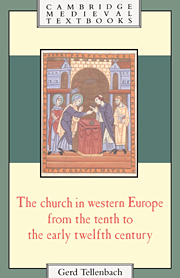Book contents
- Frontmatter
- Contents
- Translator's note
- Author's preface
- List of abbreviations
- 1 Western Christendom and its environment in the tenth and eleventh centuries
- 2 The church and its manifestations on earth
- 3 The material existence of the churches and the clergy
- 4 Religious life and thought
- 5 The beginnings of the revolution in church history
- 6 Gregory VII (1073–1085)
- 7 Continuing conflicts between established principles
- 8 Pope, church, and Christendom
- Epilogue
- Select bibliography
- Index
- Cambridge Medieval Textbooks
8 - Pope, church, and Christendom
Published online by Cambridge University Press: 05 June 2012
- Frontmatter
- Contents
- Translator's note
- Author's preface
- List of abbreviations
- 1 Western Christendom and its environment in the tenth and eleventh centuries
- 2 The church and its manifestations on earth
- 3 The material existence of the churches and the clergy
- 4 Religious life and thought
- 5 The beginnings of the revolution in church history
- 6 Gregory VII (1073–1085)
- 7 Continuing conflicts between established principles
- 8 Pope, church, and Christendom
- Epilogue
- Select bibliography
- Index
- Cambridge Medieval Textbooks
Summary
THE PAPAL PRIMACY IN SPIRITUAL MATTERS
The papal claim to lead the church and the restructuring of church unity
The unity of the church has its origins essentially in the belief in the omnipresence of Christ in the sacraments, in the liturgy, and in prayer. Its organisational forms by contrast are rooted more in specific communities which coexist with one another – individual churches and parishes, dioceses, provinces, patriarchates, and synods held within them – than in the great overriding community of faith. The great turning-point under Constantine the Great and the subsequent Christianisation of the Roman empire produced a temporary and fairly superficial unification, whose problems soon became apparent. Gelasius I's doctrine of the two powers, for centuries the theoretical basis of unity, showed reservations in the way it recognised that sacerdotium and regnum belonged to ‘this’ world. In any case, reality did not correspond to this famous theory; often enough we can observe the old feeling that the realm of Christ and that of the world were alien to one another, something which was either to be rejected militantly or accepted humbly.
The unifying effects of the Roman empire did not long survive. The particular kingdoms which emerged and gradually subordinated the churches with their territories came on the whole to be a hindrance to contacts between the churches, which nevertheless still occurred here and there. The national and regnal churches were to a greater or lesser extent autonomous and not easily influenced from outside.
- Type
- Chapter
- Information
- Publisher: Cambridge University PressPrint publication year: 1993



